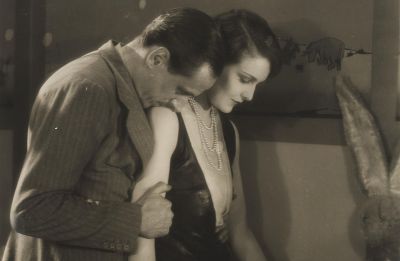
THE FIRST BORN
(Il primogenito, Gb/1928) R.: Miles Mander. D.: 88'. Did. inglesi
Restaurato da BFI
Introduce Bryony Dixon (BFI)
Accompagnamento al pianoforte di Stephen Horne
Precede
UNO SCANDALO IN CASA POLIDOR (Italia/1912) R.: Ferdinand Guillaume. D.: 9'
Accompagnamento al pianoforte di Maud Nelissen
Adattamento di Miles Mander da un suo romanzo e opera teatrale, The First Born descrive l'ipocrisia dei ceti alti e la tensione tra conformismo e una morale più moderna attraverso il rapporto tra Sir Hugo Boycott (Mander) e la sua giovane sposa Madeleine, interpretata con sensibilità da una Madeleine Carroll ancora bruna. Dapprima intensa e appassionata, l'unione dà segni di cedimento quando la donna si rivela incapace di dare alla luce un erede. Il marito parte allora per il Nord Africa, dove ha un'amante, e pur di riportare a casa l'uomo Madeleine si convince a fingere proprio il figlio illegittimo di un'altra donna. Ormai a brandelli e avvelenato dalla disonestà, il matrimonio si incrina. Il trattamento è insolitamente 'adulto' e inventivo. L'esempio migliore è una sequenza, girata con la cinepresa a mano, durante la quale Boycott si insinua nella camera da letto coniugale per infastidire e tormentare la moglie che si trova nel bagno. La struttura e la coerenza di questo film lo rendono magistrale, e vanno quasi certamente attribuite alla sceneggiatrice Alma Reville. Una scena in particolare è molto 'hitchcockiana': non possiamo menzionarla senza svelare la trama ma capirete subito di quale si tratta quando vedrete il film. Che il famoso 'Hitchcock's touch' vada dunque riconosciuto a Mrs non meno che a Mr Hitchcock? Sarebbe forse un'esagerazione, ma comunque vadano spartiti i meriti tra il regista Mander e l'abile sceneggiatrice Reville, il film è un tour de force della tarda epoca del muto.
The First Born, adapted by Miles Mander from his own novel and play, deals with the double standards of the upper classes and the tension between conformity and a more modern morality. It concerns the relationship between Sir Hugo Boycott (Mander) and his young bride Madeleine, sensitively played by a pre-blonde Madeleine Carroll. Their relationship is intense and passionate but founders when she fails to produce an heir. He leaves for North Africa where he has a native mistress, while she is persuaded to pass off an illegitimate child as her own in order to bring him back. The patched-up relationship, built on dishonesty, begins to fracture. The treatment is unusually 'adult' and made with a degree of invention. The most striking example is a handheld camera sequence as Boycott stalks through the marital bedroom to tease and torment his wife in the bath. The film is masterly in its construction and continuity for which we almost certainly have to thank Alma Reville who wrote the scenario. One scene in particular is very 'Hitchcockian' - impossible to mention without giving away the plot but you'll know it when you see it. Could it be that the famous 'Hitchcock touch' is as much to do with Mrs as with Mr? Perhaps that would be to overstate the case but whatever the balance of contribution between Mander as director and Reville's scripting skills the film is a tour de force of late silent filmmaking.

Tariffe:
Ingresso libero
Richiesta di posti riservati per i clienti Gruppo Hera
Aria condizionata
Accesso disabili
Tel. 051 522285











